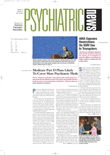Autism is characterized by impaired social interaction, abnormal language development, repetitive patterns of behavior, and serious behavioral problems such as self-injurious behavior, aggression, and tantrums.
Although second-generation antipsychotics do not seem to improve social interaction and communication in children with autism, they do appear to dampen the repetitive behavior patterns, Christopher McDougle, M.D., chair of psychiatry at Indiana University, and colleagues reported in the June American Journal of Psychiatry (Psychiatric News, June 3).
Moreover, second-generation antipsychotics appear to be capable of countering serious behavioral problems in children with autism, James McCracken, M.D., a professor of child psychiatry at the University of California at Los Angeles, and his team now report in the July issue of that journal.
In the first arm of their study, 101 children with autism received either risperidone or a placebo for eight weeks. Risperidone was found to reduce aggression, tantrums, and self-injurious behavior substantially. The researchers thus decided to see whether such improvement would endure over a longer time period.
Sixty-three subjects who responded positively to risperidone in the first trial agreed to participate in a longer one, which consisted of a 16-week open-label treatment with risperidone. Eighty-three percent were found to be much improved or very much improved as far as maladaptive behaviors were concerned.
Thirty-eight of the subjects were then enrolled in an eight-week, randomized, placebo-controlled discontinuation trial. Half of the subjects continued to receive risperidone, and half were given a placebo. Sixty-three percent of the placebo group resumed maladaptive behaviors, whereas only 13 percent of the risperidone group did—a significant difference. The return of aggression, tantrums, and agitation was five times as great in the placebo-substitution group as in the subjects who continued to take risperidone.
“Taken together, these data strongly suggest that risperidone is an efficacious treatment for short- and intermediate-term management of serious behavioral problems in children with autism,” the researchers concluded.
Although the average daily dose of risperidone used in the study—about 2 mg—was relatively low, subjects gained considerable weight from it. Thus, “longer-term observations to determine the clinical significance of weight gain as well as other adverse events are needed to evaluate the risk-benefit ratio for risperidone treatment in children with autistic disorder,” the investigators said.
The National Institute of Mental Health is supporting a new study to see whether combining behavior therapy with initial risperidone treatment might help prolong improvement well beyond the withdrawal of the medication. That study should be completed in about two years. “The new study could have an important impact on recommendations for the use of these medications in autism,” McCracken told Psychiatric News.
McCracken and his group, as well as others, are conducting trials to look more closely at the cognitive effects of these drugs in children with autism. For example, might they be able to facilitate learning in some areas? Or could they impair learning in some children?
Another area they are exploring involves the provocative field of psychiatric pharmacogenomics—using patient's genes to predict medication response (Psychiatric News, May 20). “We have some new data that suggest that this area may be very fruitful in relation to atypical-antipsychotic effects in children with autism,” said McCracken.
The study was financed by the National Institutes of Health and the Korczak Foundation.
Am J Psychiatry 2005 162 1361
